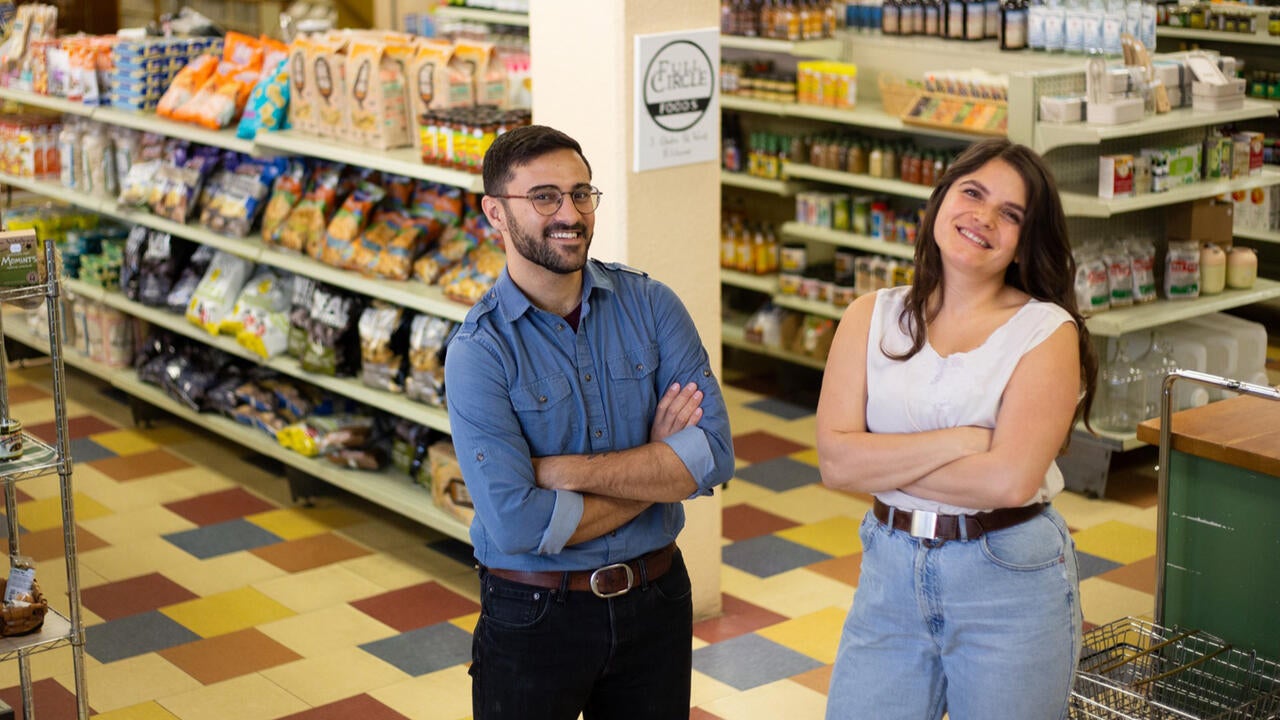
Small business, big connections
What large grocery chains can learn from sustainable community shops as a result of the pandemic

What large grocery chains can learn from sustainable community shops as a result of the pandemic
By Natalie Quinlan University RelationsFor just over two years, Waterloo alumni Julia Gogoleva (BSc ’15) and Sam Nabi (BES ’13) have been running Full Circle Foods, a medium-sized grocery store located in the heart of Kitchener.
The pair took ownership of the almost 40-year old community shop after it went up for sale back in 2018. Neither could have predicted the world-wide pandemic two-years later.

Julia Gogoleva (BSc ’15)
“Of course, it’s been a little more stressful and a bit more work keeping products coming in, but it hasn’t been a monumental difference to what we normally do,” Nabi says.
Unlike mammoth grocery-store chains who faced bare shelves, unpredictable supply demands and worried customers rushing tills, Nabi credits his local suppliers as the key behind Full Circle Foods’ uninterrupted business.
“We have been working with certain suppliers since 1981, with a very diffused supply chain and that’s given us a lot of flexibility,” Nabi says. “The fact that we deal with such a variety of suppliers means that we can adjust and adapt if we don’t get something from one distributor, we can go to someone else.”
By having a sustainable and localized business model, Full Circle Foods has stayed afloat, even offering its workers an increase in pay during the pandemic on top of their already-above minimum-wage salaries.
 Sam Nabi (BES ’13)
Sam Nabi (BES ’13)
“One of the things we had implemented just before the pandemic, was becoming a living wage employer,” Nabi says. “We’re not interested in hiring minimum wage workers who have high-turnover and don’t see a path to a long-term career with the store. What that means is when there’s a crisis and big changes need to be made, people aren’t just coming to their jobs and going home. The staff care about their role in the store and serving their community.”
Nabi’s comments echo a familiar tune prompted by an opinion piece authored by Waterloo’s own Sarah Burch, professor with the Faculty of Environment and Canada Research Chair.
“Deeply sustainable and small businesses — those that place environmental or social value at the core of their business model, on par with (or even ahead of) growth and profit — can teach us important lessons about the ingredients of resilience, justice and ecological integrity in Canadian communities,” Burch writes. “Is our goal simply to build back what we had, which arguably left us deeply vulnerable to such a shock, or to build back better?”
It’s an approach that, in Burch’s words, requires more collaboration than competition and valuing resilience over efficiency, supporting local supply chains and offering livable wages. The road to success in a current and post-crisis world is based on a systemic approach that values its people at the core, not the corporations at the top.
“We have direct knowledge of our customers and have the finger of the pulse of everything that’s going on. So, that’s the main difference between us and a large superstore or supermarket,” Nabi says. “If big chains gave their store managers more discretion with budgeting and control over meeting the individual needs of the community rather than some national sales goal, maybe we would have seen less empty shelves.”
Photo credit: Meghan Weber-Lipton

Read more
Small and medium-sized businesses create the majority of jobs in Canada, but increasingly we’re seeing that these are the businesses that are succumbing to the pandemic.
Why are some small businesses surviving while others are closing their doors for good?

Read more
Redefining capstone learning by bringing students, faculty and community partners together to tackle real-world challenges

Read more
Here are the people and events behind some of this year’s most compelling Waterloo stories
The University of Waterloo acknowledges that much of our work takes place on the traditional territory of the Neutral, Anishinaabeg, and Haudenosaunee peoples. Our main campus is situated on the Haldimand Tract, the land granted to the Six Nations that includes six miles on each side of the Grand River. Our active work toward reconciliation takes place across our campuses through research, learning, teaching, and community building, and is co-ordinated within the Office of Indigenous Relations.